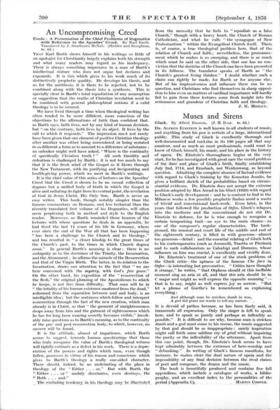Muses and Sirens
Gluck. By Alfred Einstein. (J. M. Dent. 4s. 6d.) Dn. ALFRED EINSTEIN is well known to all students of music, and anything from his pen is certain of a large, international public. This study of. Gluck is excellently_ thorough and well-documented and contains in its 190 pages all that any amateur, and as much as most professionals, could want to know of Gluck himself, his music, and-his place in the history of-opera: --Dr. Einstein's thoroughness begins at the very start, for he has investigated with great care the vexed problem of the :date and place of Gluck's _birth, film_ establishing July 2nd, 1714, and Erasbach, not Weidenwang, as beyond question. Admitting the comPlefe nbsence of factual evidence with regard to Gluck's training by the Komotau Jesuits, he gives a brilliant sketch of the probabilities based on circum- stantial evidence. Dr. Einstein does not accept the extreme position adopted by Max Arend in his Gluck (1920) with regard to Gluck's early development : and he is content to find in the Milanese works a few possibly prophetic flashes amid a waste of trivial and conventional hack-work. Even later, in the years that followed the production of Orfeo, Gluck's relapses into the mediocre and the conventional do not stir Dr. Einstein to defence, for he is wise enough to recognise a certain temporising trait—an eye to the main chance—as one of the composer's regular characteristics. The back- ground, the musical and court life of the middle and end of the eighteenth century, is filled in with generous—almost too generous—detail : and the essential relating of Gluck both to his contemporaries (such as Jommelli, Traetta or Piccinni) and to such collaborators as Calzabigi and Durazzo, whose influence on him was crucial, is excellently and vividly done.
Dr. Einstein's treatment of one of the stock problems of the Gluck critic—the aptness of the famous Che fare in Orfeo—is interesting but provocative. " Critics have thought it strange," he writes, " that Orpheus should at this ineffable moment sing an aria at all, and that this aria should be in C major and might as well express the opposite meaning "- that is to say, might as well express joy as sorrow. "But let a phrase of Goethe's be remembered as explaining everything :
And although man be stricken dumb in woe, A god did grant me words to tell my sorrow. „ It is devoid of pathos because, as has been finely said, it transcends all expression. Only the singer is left to speak here, and to speak as 'Surely and perhaps as inflexibly as possible." It is difficult to see why, because man is stricken dumb and a god must come to his rescue, the music suggested by that god should be so inappropriate:: surely inspiration might call forth some sublime cry of grief without impairing the purity or the inflexibility of the utterance. Apart from this one point, though, Dr. Einstein's book seems to have kept admirably between the extremes of hero-worship and " debunking." In writing of Gluck's famous manifesto, for instance, he makes clear the" dual nature of opera and the impossibility of any final decision between the rival claims of poet and composer, the drama and the music.
The book is beautifully produced and contains five full appendices, which include a catalogue of works, a biblio- graphy, and an excellent -index to the personalities of the
• . •






































 Previous page
Previous page